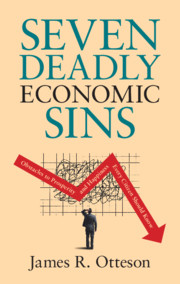Book contents
- Seven Deadly Economic Sins
- Seven Deadly Economic Sins
- Copyright page
- Dedication
- Contents
- Preface
- Introduction
- 1 Wealth Is Positive-Sum
- 2 Good Is Not Good Enough
- 3 There Is No Great Mind
- 4 Progress Is Not Inevitable
- 5 Economics and/or Morality
- 6 Equality of What?
- 7 Markets Are Not Perfect
- Conclusion
- Postscript
- References and Further Reading
- Acknowledgments
- Index
2 - Good Is Not Good Enough
Published online by Cambridge University Press: 09 April 2021
- Seven Deadly Economic Sins
- Seven Deadly Economic Sins
- Copyright page
- Dedication
- Contents
- Preface
- Introduction
- 1 Wealth Is Positive-Sum
- 2 Good Is Not Good Enough
- 3 There Is No Great Mind
- 4 Progress Is Not Inevitable
- 5 Economics and/or Morality
- 6 Equality of What?
- 7 Markets Are Not Perfect
- Conclusion
- Postscript
- References and Further Reading
- Acknowledgments
- Index
Summary
Throughout most of human history, the total amount of usable resources people had at their disposal was consistently low – the contemporary equivalent of between $1 and $3 per person per day. One cannot do much with that. Could you live today on, say, $3 per day? To furnish you with all your needs – from food, clothing, and shelter, to music, coffee, graduate school, that new pair of shoes, and the next iPhone? You might be able to survive, but only barely; you would likely have to give up an enormous number of the things you enjoy in life today – and you had better hope you do not get sick or break a bone. The proportion of human beings living at that historical low level, however, is today lower than it has ever been.
- Type
- Chapter
- Information
- Seven Deadly Economic SinsObstacles to Prosperity and Happiness Every Citizen Should Know, pp. 63 - 97Publisher: Cambridge University PressPrint publication year: 2021

